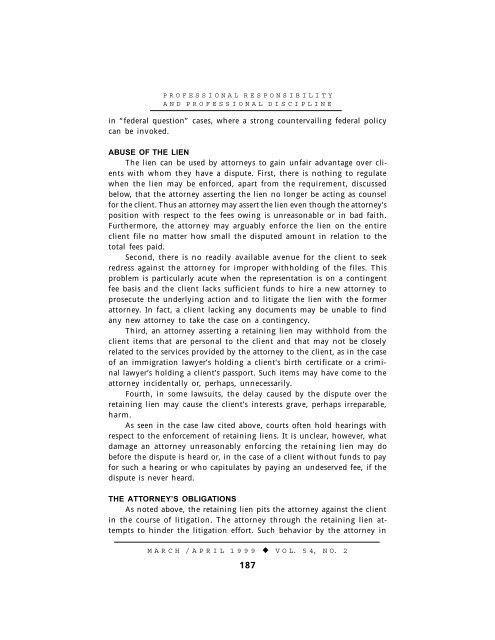THE RECORD - New York City Bar Association
THE RECORD - New York City Bar Association
THE RECORD - New York City Bar Association
You also want an ePaper? Increase the reach of your titles
YUMPU automatically turns print PDFs into web optimized ePapers that Google loves.
P R O F E S S I O N A L R E S P O N S I B I L I T Y<br />
A N D P R O F E S S I O N A L D I S C I P L I N E<br />
in “federal question” cases, where a strong countervailing federal policy<br />
can be invoked.<br />
ABUSE OF <strong>THE</strong> LIEN<br />
The lien can be used by attorneys to gain unfair advantage over clients<br />
with whom they have a dispute. First, there is nothing to regulate<br />
when the lien may be enforced, apart from the requirement, discussed<br />
below, that the attorney asserting the lien no longer be acting as counsel<br />
for the client. Thus an attorney may assert the lien even though the attorney’s<br />
position with respect to the fees owing is unreasonable or in bad faith.<br />
Furthermore, the attorney may arguably enforce the lien on the entire<br />
client file no matter how small the disputed amount in relation to the<br />
total fees paid.<br />
Second, there is no readily available avenue for the client to seek<br />
redress against the attorney for improper withholding of the files. This<br />
problem is particularly acute when the representation is on a contingent<br />
fee basis and the client lacks sufficient funds to hire a new attorney to<br />
prosecute the underlying action and to litigate the lien with the former<br />
attorney. In fact, a client lacking any documents may be unable to find<br />
any new attorney to take the case on a contingency.<br />
Third, an attorney asserting a retaining lien may withhold from the<br />
client items that are personal to the client and that may not be closely<br />
related to the services provided by the attorney to the client, as in the case<br />
of an immigration lawyer’s holding a client’s birth certificate or a criminal<br />
lawyer’s holding a client’s passport. Such items may have come to the<br />
attorney incidentally or, perhaps, unnecessarily.<br />
Fourth, in some lawsuits, the delay caused by the dispute over the<br />
retaining lien may cause the client’s interests grave, perhaps irreparable,<br />
harm.<br />
As seen in the case law cited above, courts often hold hearings with<br />
respect to the enforcement of retaining liens. It is unclear, however, what<br />
damage an attorney unreasonably enforcing the retaining lien may do<br />
before the dispute is heard or, in the case of a client without funds to pay<br />
for such a hearing or who capitulates by paying an undeserved fee, if the<br />
dispute is never heard.<br />
<strong>THE</strong> ATTORNEY’S OBLIGATIONS<br />
As noted above, the retaining lien pits the attorney against the client<br />
in the course of litigation. The attorney through the retaining lien attempts<br />
to hinder the litigation effort. Such behavior by the attorney in<br />
M A R C H / A P R I L 1 9 9 9 ◆ V O L. 5 4, N O. 2<br />
187

















